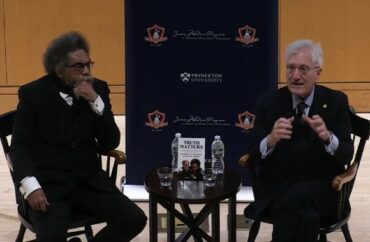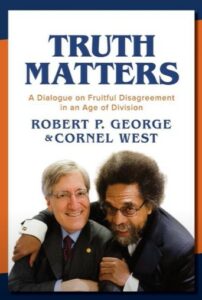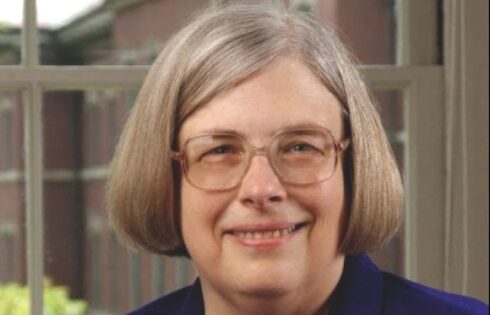
Cornel West and Robert George offer lessons from their friendship about humility and the pursuit of truth
Two professors from opposing sides of the political aisle who have remained friends for 20 years recently published a book about how to have productive disagreements.
Robert George, law professor and director of the James Madison Program in American Ideals and Institutions at Princeton University, spoke to The College Fix recently about the book he co-authored with Cornel West, the Dietrich Bonhoeffer chair at Union Theological Seminary.
George called his relationship with West “a real blessing,” relating how they and their families remain close despite their fundamental disagreements.
The book, “Truth Matters: A Dialogue on Fruitful Disagreement in an Age of Division,” was published earlier this year.
It is a series of conversations between George and West recorded in fall of 2023 and spring of 2024 on “relating current issues to deeper questions of knowledge, faith, the search for truth and common ground, and the vocation of the teacher in the context of the modern university.”
George (pictured right) is considered one of the foremost conservative scholars today. He is pro-life, Catholic, and an opponent of same-sex marriage, and he has held a number of high-ranking roles on U.S. civil rights and religious freedom commissions.
West, (pictured left) a Christian and a socialist, is a well-known provocative voice from the left. He is pro-choice, has held professorships at schools like Yale and Princeton, and ran as an independent candidate in the 2024 presidential election.

In their book, George and West discuss what truth is, how to have a respectful conversation with people on the other side of an issue, and what ways people can productively discuss hot-button topics like abortion, race, and identity. They also write about the importance of intellectual humility in individuals’ pursuit of truth.
George recently spoke with The Fix over the phone about how he and West have maintained a close friendship despite their differences and offered advice about how young people can do the same.
The College Fix: It sounds like things could get fiery between you and Cornel West, but you always remain respectful to each other. Is that a thought process or does it just come as second nature to you?
Robert George: It comes second nature. I don’t think either of us ever feels the temptation to become hostile toward the other one or rude or aggressive, and that’s because both of us are fundamentally dedicated to getting to the truth of things… At the same time, both of us, I think, have a deep sense of our own fallibility. We know that, like every other human being, we can get things wrong, … and undoubtedly are wrong about some things, and not just the minor, trivial, superficial things of life but even the big, important things… So when that’s your attitude, you’re always interested in hearing what an intelligent person on the other side has to say.
TCF: It’s born out of a true sort of understanding for each other’s thought processes and a true understanding that both of you are in the search for truth.
RG: Well, that’s right… It’s pointless to have a conversation with somebody who is an ideologue or a dogmatist, or who, for practical purposes, regards himself or herself as infallible. But, if you have a person who’s a sincere truth seeker… however much you may disagree… you’re united by your desire sincerely to get it the truth and to be corrected if you are in error.
TCF: Do you have any specific advice in that vein for Gen Z?
RG: Get out of your silos. If you don’t have a friend who disagrees with you about important issues, find a friend… You’re gonna benefit each other, you’re gonna help each other to learn. Number two, with your friends, never ever regard a disagreement, no matter how deep it is… as a personal assault. I think what’s happened these days is people have come to wrap their emotions so tightly around their convictions that they perceive dissent from their convictions as a personal attack. And that is toxic to genuine conversation.
TCF: What is your advice for young conservatives specifically?
RG: My advice is do not censor yourself. Do not pander to those who, for the most part, are on the liberal side … who would make the price of friendship be either agreement or silence. Do not agree to terms of friendship where you are agreeing to censor yourself… in return for maintaining the friendship. That’s not a friendship worth having. The real friendship worth having is when two people who disagree can talk even about issues that really deeply matter to them in a frank and civil manner.
TCF: Do you find that students are entrenched in echo chambers or have intellectual discussions differently?
RG: It’s more common for liberal students than conservative students to be in echo chambers. It’s not uncommon for conservatives to be in echo chambers, too. The more common problem for conservatives is self-censorship. So, my advice is really the same for everybody, but I think the need for the advice about avoiding self-censorship is more pertinent to conservatives today, and the need for advice not to take disagreement as a personal assault is more pertinent to liberals today.
TCF: How do we encourage people to respect historical figures that have been vilified for imperfection?
RG: The way to begin is by candidly acknowledging each of us is undoubtedly wrong about some things… So on the simple principle of fairness — even if we believe, quite rightly, that they’re wrong about some very important moral questions — that should not prevent us from acknowledging their greatness on matters on which they were great, and it should not prevent us from looking to them as role models for the great things that they did.
TCF: Do you see that behavior from conservatives at all, or is it really more on the left?
RG: Here I think we need to divide the left. There’s the woke left and then there is the anti-woke left. Anti-woke people on the left realize that… none of us should be held to standards that we ourselves would not have lived up to in an earlier age. Then there are people on the woke left who don’t seem to have gotten that memo… Cornel West advocates for what he calls the “Democracy of the Dead.” He says that the living do not have a monopoly on truth, or virtue, or justice, and that we have a lot to learn from the great figures in the past, so Cornel is a very good example on that issue.
TCF: Is it possible to have a good conversation with someone who believes their opinion on a certain issue means more because they identify a certain way?
RG: I don’t think it’s really possible to have a fruitful, truth-attaining conversation with somebody who believes they’ve got some special, privileged access to the truth because of their race or ethnicity. I can see someone saying, “Well I’ve had some experiences that you haven’t had … that are tied to a race or an ethnicity in a particular cultural setting” – I can see that, but if somebody says, “You are not an equal in this conversation because you don’t have the special privileged access to the truth that I have” – then that’s not gonna be a fruitful conversation.
TCF: And finally, tell me more about your relationship with Professor West …
RG: It’s been a real blessing working with Cornel. We began teaching together 20 years ago. We’re no longer together at Princeton, but we’ve lectured all over the country — really all over the world — and we’ve done lots of programming together. Every time we can spend private time together, we do that. Our families have become very close to each other. As you can tell, we’re interested in the same issues, we’re interested in the same writers… we draw on the same sources. So it’s really been a wonderful relationship.
Editor’s note: The interview has been edited for length and clarity.
MORE: U. Oregon to pay $191,000 after blocking conservative professor on Twitter
IMAGE CAPTION AND CREDIT: Professors Cornel West and Robert George discuss their book, ‘Truth Matters,’ at Princeton University; James Madison Program in American Ideals and Institutions/YouTube
Like The College Fix on Facebook / Follow us on Twitter






Please join the conversation about our stories on Facebook, Twitter, Instagram, Reddit, MeWe, Rumble, Gab, Minds and Gettr.